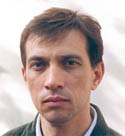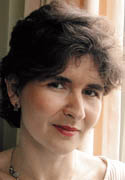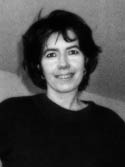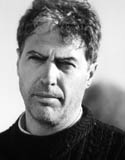TOUCH THE SOUND
Germany / UK 2004 99min
Director: Thomas Riedelsheimer
Acclaimed Scottish percussionist Glennie takes us on this free-flowing, contemplative journey
with the goal of sensitizing viewers to sound. Nearly deaf as a result of a neurological disorder,
Glennie claims her entire body can hear. Director Thomas Riedelsheimer states, “I have never met
anyone before who has such a finely developed sense of the quality of sounds as Evelyn.” Glennie
performs in cities from New York to Kyoto with a variety of classical, found and experimental instruments,
from which she is able to coax a startling variety of sounds. Performance footage is blended with breathtaking
impressionistic prethodni_festivali/pages/2005/images of the world around us that implore spectators to be more attuned to their surroundings.
Just as the film’s groundbreaking sound design focuses attention on the musical quality of every noise -
including silence – Riedelsheimer’s remarkably rich cinematography invites viewers to see everything from busy
streetscapes to the trembling grains of sand on a beach with new eyes. A constantly moving camera transforms
the banal into the sublime and sweeps us into its transcendent vision with both intimate close-ups and epic
landscapes.
Touch the Sound is a mesmerizing experience that demands to be seen on the big screen.
I was on the jury at the Leipzig festival in October and there was no doubt among us that Riedelsheimer’s film was unique, the best of the 2004 selection of this prestigious festival. From the very first moment you are aware that you look at a Film, you can see what a camera can achieve in the right hands and you meet this fantastic artist (Evelyn Glennie) who introduces you to a magic of sound that you have never before heard. Or seen!
Tue Steen Müller
Thomas Riedelsheimer

Born September 1963; studied at the Academy for Film and Television in
Munich(1984-1991); since 1986 free-lance author, director and cameraman in Germany and abroad
(Somalia, Tanzania, South Africa, New Zealand, Latvia, Russia, Tibet, Nepal, Japan, Canada, Scotland, etc.);
lecturer at seminars on cinematography at the Film Academy in Munich.
2001 till present: director of the film production company Filmquadrat.
Rivers and Tides - Germany / UK 2000, 90 min
Metamorphosen - Germany 1997/98, 45 and 93 min
Lhasa und der Geist Tibets - Germany 1996/97, 60 min
“Schweben heißt Lieben” - Germany 1994, 80min
Bildschirmherrschaft - Germany 1988/89, 60min
Sponsae Christi - Germany 1991/92, 68min












